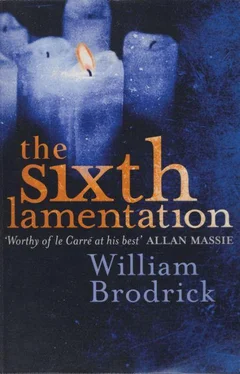William Brodrick - The Sixth Lamentation
Здесь есть возможность читать онлайн «William Brodrick - The Sixth Lamentation» весь текст электронной книги совершенно бесплатно (целиком полную версию без сокращений). В некоторых случаях можно слушать аудио, скачать через торрент в формате fb2 и присутствует краткое содержание. Жанр: Триллер, на английском языке. Описание произведения, (предисловие) а так же отзывы посетителей доступны на портале библиотеки ЛибКат.
- Название:The Sixth Lamentation
- Автор:
- Жанр:
- Год:неизвестен
- ISBN:нет данных
- Рейтинг книги:5 / 5. Голосов: 1
-
Избранное:Добавить в избранное
- Отзывы:
-
Ваша оценка:
- 100
- 1
- 2
- 3
- 4
- 5
The Sixth Lamentation: краткое содержание, описание и аннотация
Предлагаем к чтению аннотацию, описание, краткое содержание или предисловие (зависит от того, что написал сам автор книги «The Sixth Lamentation»). Если вы не нашли необходимую информацию о книге — напишите в комментариях, мы постараемся отыскать её.
The Sixth Lamentation — читать онлайн бесплатно полную книгу (весь текст) целиком
Ниже представлен текст книги, разбитый по страницам. Система сохранения места последней прочитанной страницы, позволяет с удобством читать онлайн бесплатно книгу «The Sixth Lamentation», без необходимости каждый раз заново искать на чём Вы остановились. Поставьте закладку, и сможете в любой момент перейти на страницу, на которой закончили чтение.
Интервал:
Закладка:
‘It began with resentment,’ said Anselm. ‘Perhaps it goes back earlier, to the sort of differences of background and opinion we have here at Larkwood. But it’s simple enough: Pleyon had his nose put badly out of joint by Rochet on more than one occasion. Events conspired so that Pleyon got his chance to have the final swing back. If what I’m told is right, it seems Pleyon may have been an anti-Semite, and that spurred his attempt to pull down Rochet. He betrayed The Round Table to Victor Brionne, who then told Schwermann. ‘
Father Andrew listened, his bright eyes chasing the whirl of sparks. He said, ‘How do you know Pleyon had any contact with Brionne?’
‘I don’t. It’s just an assumption. There’s no other explanation for the facts.’
‘How did either or both of them know all the names?’
‘I’m not sure. I’ve a suspicion Pleyon only knew of Rochet, and perhaps one or two others, but that Brionne already knew the rest from before the war.’
Father Andrew gazed into the fire and said playfully ‘What a coincidence that they should meet, each with a reason of their own to bring down their former friends.’
‘Tragedy often arises out of coincidence,’ replied Anselm defensively trying to be wise.
‘I suppose the pieces fit.’
‘The assumptions are confirmed by what happened next.’
‘Proceed.’ The Prior seemed not to be taking Anselm altogether seriously.
‘When the war ended the two runaways knew where to turn — Les Moineaux, and fortune had conveniently lodged Pleyon in the Prior’s seat. He arranged their escape, planning to tell Rome a fairy tale about deceptive appearances to cover his own misdemeanour. But he died before he could really sink his teeth into the lies. As it happens, Chambray had already told Rome the full story — which includes the fact that Schwermann was passed on to us’ — Anselm glanced at his Prior: no emotion disturbed the attentive calm — ‘and they did absolutely nothing.’
Father Andrew raised his hands to the flames and said, ‘Tell me about the papers that were torn up by that poor woman.
Anselm described what he had seen — the list setting out the knights of The Round Table and the two deportation records, all signed by the man Anselm had urged to give evidence. He said, ‘It seems Schwermann was a forward thinker. In the event that Germany lost the war he kept those documents so he could blackmail Victor Brionne.’
‘Compelling him to do precisely what?’
‘To testify that Schwermann saved someone when he got the chance… to give a handle for doubt… for pity.’
The Prior reached for a poker and jabbed the embers. With a hiss flame rushed upon exposed wood. Shadows twisted and shivered. He said, ‘And what do you say Rome were doing when they sent you off to find Victor Brionne?’
‘When Schwermann came back to Larkwood it was like a signal, a threat — he could expose Rome as he had been exposed. That would mean everything Chambray had told them would come out into the open. It appears Rome glimpsed a solution based upon simple cause and effect — if Schwermann was reprieved, the face of the Church would be saved.’
‘It has to be said,’ observed Father Andrew, raking with the poker once more, ‘Rome is often more concerned about her complexion than her conduct.’
‘In this case, if you’ve seen both, it’s pretty unattractive, said Anselm. Dismay at the calculating betrayal of his trust had settled into a judgment. ‘They seem to have thought that if Brionne gave evidence there was a good chance he would absolve his former master, if only to protect himself. All they needed was someone to prompt him to come forward. So they used me’ — he remembered standing in the cold, looking into ‘Pilgrim’s Rest’ at the children with their beakers — ‘and there’s a grim irony in all this-’
‘Which is?’
‘I suspect Brionne was hiding not just for his own sake but also to spare his family There was no point in devastating them for the price of a lie. But I pushed him and now it’s been told.’
The fire crackled quietly, sucking in the darkness of the room. Father Andrew said simply. ‘You have been thinking hard.’ The two monks sat joined in contemplation: Anselm rehearsing the future; the Prior… what was he doing? Anselm sensed he was listening to the past.
Anselm said, ‘I will have to go to the police.’
‘Perhaps.’
‘And it will all come out.’
‘Perhaps.’
‘And Larkwood, Les Moineaux, Rome; contempt will fall upon us all like rain.’
‘Perhaps.’ Father Andrew’s chair scraped across the flags and he moved thoughtfully to the window overlooking the cloister, the heart of the monastery, concealed by the wet night. The firelight flickered on the glass. Father Andrew raised an arm and wrote a name slowly upon the condensation. It read: ‘Agnes’. Hairline streams of water faltered down the pane from each letter. He said, ‘Something tells me you should first go back to Victor Brionne.’
‘Why?’ asked Anselm.
‘Because I am struck by the one thing you have not mentioned tonight: he believes Agnes to be dead, but you know she’s alive.’
Chapter Thirty-Nine
1
Lucy’s parents had arranged to collect their daughter on Sunday morning on their way back from a short break in Canterbury. Father, mother and daughter would then go to Chiswick Mall for an afternoon with Agnes.
The doorbell tore through the air twice. It was a buzzer more suited to the requirements of the fire brigade. Lucy could not hear the electric shriek without thinking urgency stood panting on the street. Her mother peeped her head round the door, eyelids aflutter. She stepped inside, commenting on Grandpa Arthur’s clock as if he were there, nodding, on the wall. Her father followed, handing Lucy a mug with a picture of a cathedral on its surface. ‘From the gift shop,’ he said.
‘Lovely glass,’ said Susan, turning round, ‘makes you think.’
Lucy snipped the door shut. When she joined them a moment later her mother was discreetly checking for dust; her father stood before ‘Sibyl’s Cave’.
‘It’s absorbing,’ he said. Lucy joined him; their eyes met and she understood. His daughter had a life of her own, choosing pictures, banging nails into walls, all the little things unknown to him.
‘Where did you find it?’ he asked cheerily
‘A friend gave it to me.’ The first two words almost dried her mouth. She did not expect to describe Max Nightingale in those terms, but having done so it could not be withdrawn. Instantaneously she thought of Pascal, the last time they’d met, and the old monk, known to Father Anselm, who’d died saying all that mattered were insignificant reconciliations.
‘He’s very generous,’ said Susan, adding, as if she’d peered inside an envelope, ‘assuming he’s a he.’
‘You’re right, said Lucy reaching for her coat. She moved into the hall, to a safe distance. ‘He’s a painter.’
‘An artist,’ called Susan encouragingly. ‘How lovely’
2
In times of joy or profound uncertainty Anselm always retreated to the small lake at the end of the bluebell walk, roughly halfway between the Priory and the Convent. He brought Conroy with him, who’d reached an impasse in the writing of his book. For a moment they looked across in silence towards the middle of the lake, where a stone statue of the Virgin Mary, smoothed by years of wind and rain, rose from the water, her arms open in endless submission. They climbed into a rowboat by a failing wooden landing stage and pushed off, to low groans from the black-green timbers.
The events of the previous year had increasingly brought to Anselm’s mind Tennyson’s ‘Morte d’Arthur’, large sections of which had been mercilessly thrust upon him at school. The lines often came back, like snippets of song, cuttings in the, mind. Looking at the shining levels of the lake Anselm said, ‘Sometimes I think of Sir Bedivere charged by his dying king to throw Excalibur into the place from whence it came.’
Читать дальшеИнтервал:
Закладка:
Похожие книги на «The Sixth Lamentation»
Представляем Вашему вниманию похожие книги на «The Sixth Lamentation» списком для выбора. Мы отобрали схожую по названию и смыслу литературу в надежде предоставить читателям больше вариантов отыскать новые, интересные, ещё непрочитанные произведения.
Обсуждение, отзывы о книге «The Sixth Lamentation» и просто собственные мнения читателей. Оставьте ваши комментарии, напишите, что Вы думаете о произведении, его смысле или главных героях. Укажите что конкретно понравилось, а что нет, и почему Вы так считаете.












